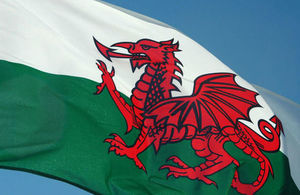Providing a service to Welsh speakers
Easy access to HMCTS services for Welsh speakers

Image of Welsh flag
Welsh is an official language in Wales (along with English) and is protected by legislation. In our role administering the courts and tribunals in England and Wales, we have a responsibility to treat the English and Welsh languages equally. It’s not just about speaking and writing in Welsh, but about supporting Welsh culture too. Our approach, led by our Welsh Language Unit based in Caernarfon, is at the forefront of this work for the Ministry of Justice.
Susan Acland Hood, Chief Executive of HMCTS, said:
We are very clear that we have a responsibility to provide quality Welsh language services and that Welsh speakers have a right to expect and access them easily. This isn’t just a matter for the courts and tribunals based in Wales, but for teams across England and Wales who provide a national service. We have done a lot of work to support this and have more to do. I want Welsh speakers to be confident in using our services, and want to assure them that if they choose to do this in Welsh, we will not compromise the quality of the service we provide or their experience of having fair and equal access to justice.
Welsh Language Commissioner, Meri Huws, said:
People in Wales have a right to use the Welsh language with public organisations such as HMCTS. The work that HMCTS have done incorporating the Welsh language when digitising their services is to be praised, and has been shared by us as an example of good practice. They have also done great work raising awareness of the Welsh language internally and offering a lively Welsh Twitter account, which encourages the public to use their Welsh services.
Welsh Language Commissioner, Meri Huws
Five things we are doing to support use of the Welsh language
-
We have revised and republished our Welsh Language Scheme. This provides clear principles for us to treat the English and Welsh languages equally.
-
A number of our online services can already be accessed in Welsh, including:
-
We have a range of dedicated phone lines for people to access guidance and support in Welsh.
Anyone calling these will get straight through to a Welsh speaker, without speaking in English first or having to select Welsh as a secondary option. This dedicated Welsh phone line puts the Welsh language first. -
You can use Welsh in court or tribunal hearings.
Asking to speak in Welsh in your hearing will not delay the hearing or have any effect on proceedings or the outcome of a case. -
We will be providing our reformed court services in Welsh too.
Through the court reform programme we are developing a broader range of online services. In 2018, we launched a number of these including online divorce, probate and civil money claims. Work is underway to translate these into Welsh so that people can select to complete online processes in Welsh from the start of a process.
Dispelling myths about the Welsh language
Hywel Hughes, Head of Welsh Language Services at HMCTS, said:
Justice ultimately revolves around communication and it’s vital that Welsh speakers have access to justice through the Welsh language. We take the obligations of our Welsh Language Scheme very seriously but have found that there are a number of myths surrounding the Welsh language that we’re keen to dispel.
Welsh has a different status to other (foreign) languages
The Welsh language is an official language of Wales (together with English) and is protected by legislation. Welsh language speaking users of HMCTS services have a legal right to use that language should they wish to. The 1993 Welsh Language Act requires public sector organisations to publish Welsh Language Schemes and the 2011 Welsh Language Measure created the role of the Welsh Language Commissioner. It confirmed the status of the Welsh language in Wales and a set of standards (language rights) that must be followed.
Welsh is a living language
Of the 6,000 or so languages in the world only around 60 (1%) have more than half a million speakers. Welsh is one of them. The number of people who understand some Welsh is increasing and by 2050 the Welsh Government has set a target of reaching a million Welsh speakers.
Welsh speakers or bilingual people will speak good English
If bilingual you are usually stronger in one language than the other (often called the mother tongue). First language Welsh speakers are better able to communicate by using their mother tongue. Speaking Welsh is a right - which also reflects identity and culture - and is about communicating in a chosen language.
There is limited demand for Welsh language services
Research and experience proves that when a Welsh language service is actively offered then it will be used. Historically Welsh language services have either not been available, visible or readily accessible. Our Welsh Language Unit receives an average of 50 Welsh language calls a month.